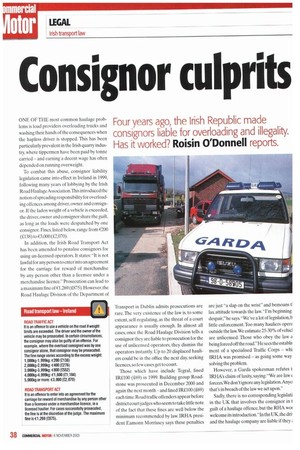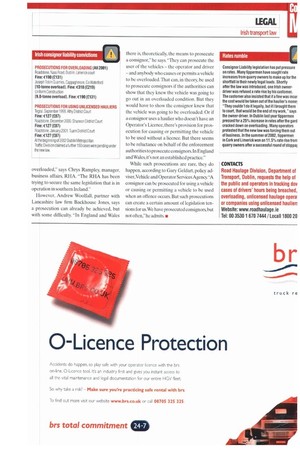Consignor culprits
Page 38

Page 39

If you've noticed an error in this article please click here to report it so we can fix it.
Four years ago, the Irish Republic made consignors liable for overloading and illegality. Has it worked? Roisin O'Donnell reports.
ONE OF THE most common haulage problems is load providers overloading trucks and washing their hands of the consequences when the hapless driver is stopped. This has been particularly prevalent in the Irish quarry industry, where tipperrnen have been paid by tonne carried and earning a decent wage has often depended on running overweight.
To combat this abuse, consignor liability legislation came into effect in Ireland in 1999, following many years of lobbying by the Irish Road Haulage Association:Ibis introduced the notion of spreading responsibility for overloading offences among driver, owner and consignor. If the laden weight of a vehicle is exceeded, the driver,owner and consignor share the guilt, as long as the loads were despatched by one consignor. Fines, listed below, range from €200 (£138) to €3,000 (am).
In addition, the Irish Road Transport Act has been amended to penalise consignors for using un-licensed operators. It states: "It is not lawful for any person to enter into an agreement for the carriage for reward of merchandise by any person other than a licensee under a merchandise licence.Prosecution can lead to a maximum fine of €.1 ,269 (£875).However, the Road Haulage Division of the Department of Transport in Dublin admits prosecutions are rare. The very existence of the law is, to some extent, self-regulating, as the threat of a court appearance is usually enough. In almost all cases, once the Road Haulage Division tells a consignor they are liable to prosecution for the use of unlicensed operators, they dismiss the operators instantly. Up to 20 displaced hauliers could be in the office the next day. seeking licences,so few cases get to court.
Those which have include Tegral. fined IR£100 (169) in 1999. Building group Roadstone was prosecuted in December 2000 and again the next month and lined IR£100 (£69) each time. Road traffic offenders appear before district court judges who seem to take little note of the fact that these fines are well below the minimum recommended by law. IRHA president Eamonn Morrissey says these penalties are just "a slap on the wrist" and bemoans ti lax attitude towards the law. "I'm beginning despair," he says, "We've a lot of legislation, b little enforcement. Too many hauliers opera outside the law. We estimate 25-30% of vehicl are unlicensed. Those who obey the law a being forced off the road." He sees the establh ment of a specialised Traffic Corps whi 1R1-LA was promised as going some way solving the problem.
However, a Garda spokesman refutes t IRHA's claim of laxity, saying: "We are law c forcers.We don't ignore any legislation.Anyo that's in breach of the law we act upon."
Sadly, there is no corresponding legislati in the UK that involves the consignor in t guilt of a haulage offence, but the RHA woi welcome its introduction."In the UK, the dri, and the haulage company are liable if they overloaded," says Chrys Rampley, manager, business affairs. RHA. "The RHA has been trying to secure the same legislation that is in operation in southern Ireland.
However, Andrew Woolfall. partner with Lancashire law firm Backhouse Jones, says a prosecution can already be achieved, but with some difficulty. -In England and Wales there is, theoretically, the means to prosecute a consignor," he says. "They can prosecute the user of the vehicles the operator and driver and anybody who causes or permits a vehicle to be overloaded. That can, in theory, be used to prosecute consignors if the authorities can show that they knew the vehicle was going to go out in an overloaded condition. But they would have to show the consignor knew that the vehicle was going to be overloaded. Or if a consignor uses a haulier who doesn't have an Operator's Licence, there's provision for prosecution for causing or permitting the vehicle to be used without a licence. But there seems to he reluctance on behalf of the enforcement authorities to prosecute consignors. In England and Wales, it's not an established practice."
While such prosecutions are rare. they do happen. according to Gary Geldart, policy adviser,Vehicle and Operator Services Agency."A consignor can be prosecuted for using a vehicle or causing or permitting a vehicle to be used when an offence occurs. But such prosecutions can create a certain amount of legislation tensions for us.We have prosecuted consignors, but not often," he admits. •
































































































































































































